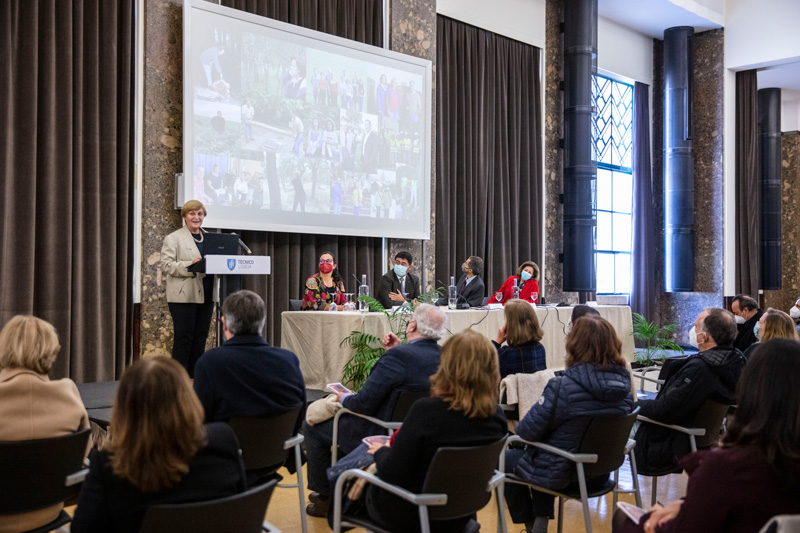President of FCT receives Maria de Lourdes Pintasilgo Award

On December 6, the Instituto Superior Técnico held the Maria de Lourdes Pintasilgo Award ceremony. As in previous years, the 5th edition of the award honored a young graduate of the institution whose research has been recognized for its scientific merit and a former student who, having completed her studies at Instituto Superior Técnico more than 15 years ago, has distinguished herself through her professional career and/or social contributions. In this edition, the award was unanimously awarded, respectively, in each category, to Maria Teresa Parreira, for the quality of the research carried out in her master's thesis and for her active involvement in student support activities, and Helena Pereira, chair of the FCT Board of Directors, for her "commendable efforts in holding demanding high-level public positions in the service of the academic and scientific community" and for her contribution to the "progress of science" and "technological innovation," according to the jury's opinion.
The creation and awarding of this prize, entirely dedicated to women, was the responsibility of the Gender Balance@Técnico working group, whose intentions were clearly highlighted by the group's coordinator, Beatriz Silva: given the context of "underrepresentation of women in STEM fields," created and perpetuated by a history of gender bias—including the idea that "engineering is for men"—it has become necessary to implement active measures to counteract these imbalances, of which this award is intended to be an example.

The figure who gives it its name and motto, Maria de Lourdes Pintasilgo, stood out at a time when women's social roles were strongly conditioned by the regime, for her "affirmation in the space of men," in the words of Rogério Colaço, president of the Instituto Superior Técnico, being one of only three women—among a student body of about 250 students – studying at the institution in the late 1940s. In the 1950s, she became the first woman to be accepted into the senior technical staff of CUF, and later made her mark in politics as the only woman to date to head a government in Portugal. At a time when "gender equality is still a journey to be traveled and not a destination reached," the president of Técnico emphasized the need to continue the fight for gender equality. More than just a tribute to Maria de Lourdes Pintasilgo, the award aims to "contribute to ensuring that this path [towards effective gender equality] continues to be followed," rewarding key contributions by current and former students of Técnico to science and technology, and thus highlighting their work.
The award winners also attached great importance to these broader aims of the award. The young winner, Maria Teresa Parreira, highlighted, in what she called the more "political" aspect of her speech, the idea that "we cannot sit back in our chairs and pat ourselves on the back, saying that the progress already being made is heading in the right direction and does not need us." Helena Pereira, in turn, pointed out that she recognized that her career, marked on the one hand by her time at the Instituto Superior Técnico and the early recognition of the quality of her work by national and international institutions, and on the other by her leadership of the FCT, contributed, in her words, to a "fantastic period of growth [in science] that we have experienced over the last 30 years," and will have "been inspiring for some" – or, we could say, some women.
In addition to the indisputable personal, academic, and professional merits of the award winners, which were emphasized in all the speeches, all those involved in the session, from the heads of the institution promoting the award to the winners themselves, always stressed the relevant social and political dimension of promoting this type of initiative, which is still necessary despite the fact that, as Rogério Colaço pointed out, we are already in the 21st century. The speech by Maria Leonor Beleza, as president of the Champalimaud Foundation, once again challenges the male majority in positions of power, raising precisely this point and highlighting the “unequal distribution [between genders] of power at the highest levels,” despite the fact that there tend to be more women with higher education. To close the session, Manuel Heitor, Minister of Science, Technology, and Higher Education, highlighted the work of the award winners, affirming the need to continue the debate on gender issues in order to address the horizontal and vertical dimensions of inequality and, given the near absence of women at the top of academic, scientific, and business careers, to "recognize those who have effectively earned the merit of reaching the top" despite structural disadvantages.